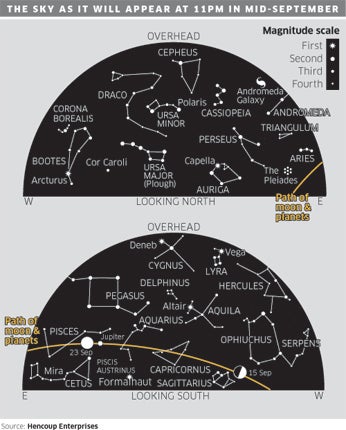The Stars: September

Your support helps us to tell the story
From reproductive rights to climate change to Big Tech, The Independent is on the ground when the story is developing. Whether it's investigating the financials of Elon Musk's pro-Trump PAC or producing our latest documentary, 'The A Word', which shines a light on the American women fighting for reproductive rights, we know how important it is to parse out the facts from the messaging.
At such a critical moment in US history, we need reporters on the ground. Your donation allows us to keep sending journalists to speak to both sides of the story.
The Independent is trusted by Americans across the entire political spectrum. And unlike many other quality news outlets, we choose not to lock Americans out of our reporting and analysis with paywalls. We believe quality journalism should be available to everyone, paid for by those who can afford it.
Your support makes all the difference.Devourer of asteroids, swallower of comets: Jupiter is a world to be reckoned with. It's the giant of our Solar System: a planet that could contain 1,300 Earths.
And there's no mistaking it in the sky at the moment, because it lies at "opposition" on 21 September – opposite the Sun in the sky, and closest to the Earth. At almost 600m kilometres away, "close" is relative. But Jupiter is vast (more than 140,000km across), and made almost entirely of hydrogen gas, so it reflects sunlight well. This month, it lords it over all the stars in the sky, and is on show all night.
You need a small telescope to get the best out of our mighty neighbour. But a good pair of binoculars, well-supported, will reveal its four brightest moons, and most mysterious of the four is Europa. Its brilliant-white, icy surface may cover a deep, moon-encompassing ocean, which – due to pummelling by Jupiter's gravity – could be warm enough to support aquatic life. And these large moons are just the tip of the iceberg: at the time of writing, the giant planet has 63 moons in orbit. Through a telescope, the king of the planets looks like a cross between a tangerine and a humbug. Despite its enormous girth, Jupiter's spin is the fastest in the Solar System – its "day" lasts only 9 hours 55 minutes – which flattens the poles and causes the equator to bulge. The same dizzy rotation draws Jupiter's clouds out into streaks of ammonia and methane. Driven by the planet's vast reserves of internal energy, these cloud systems are stormy and continually changing. Jupiter is not a planet you would want to get up close and personal with: even space probes need special shielding from its powerful magnetic field and lethal radiation belts.
What's Up
King of the night is most definitely Jupiter, blazing in the south. If you're feeling adventurous use Jupiter as a guide to the more distant Uranus. During the week of 15 to 22 September, find Jupiter in your binoculars or telescope, then move them slightly upwards. The first reasonably bright "star" you'll come across is Uranus – it's about the same brightness as Jupiter's main moons.
Above Jupiter lies the large faint square of stars that depicts Pegasus, the flying horse. To the right, the Summer Triangle is marked by three much brighter stars, Vega, Deneb and Altair.
Brilliant Venus shines low down in the evening twilight, in the south-west, at the start of September, but it's now slipping down towards the Sun. The thin crescent Moon pairs up with the Evening Star on 11 September. The second half of the month sees Mercury appearing in the morning sky. You'll spot the innermost planet low in the east around 5.30am. The fainter star above it is Regulus, marking the heart of Leo (the lion).
Diary
1: 6.22 pm Moon at Last Quarter
8: 11.30 am New Moon
15: 6.50 am Moon at First Quarter
19: Mercury at greatest elongation west
21: Jupiter at opposition
23: 4.09 am Autumn Equinox; 10.17 am Full Moon
Join our commenting forum
Join thought-provoking conversations, follow other Independent readers and see their replies
Comments